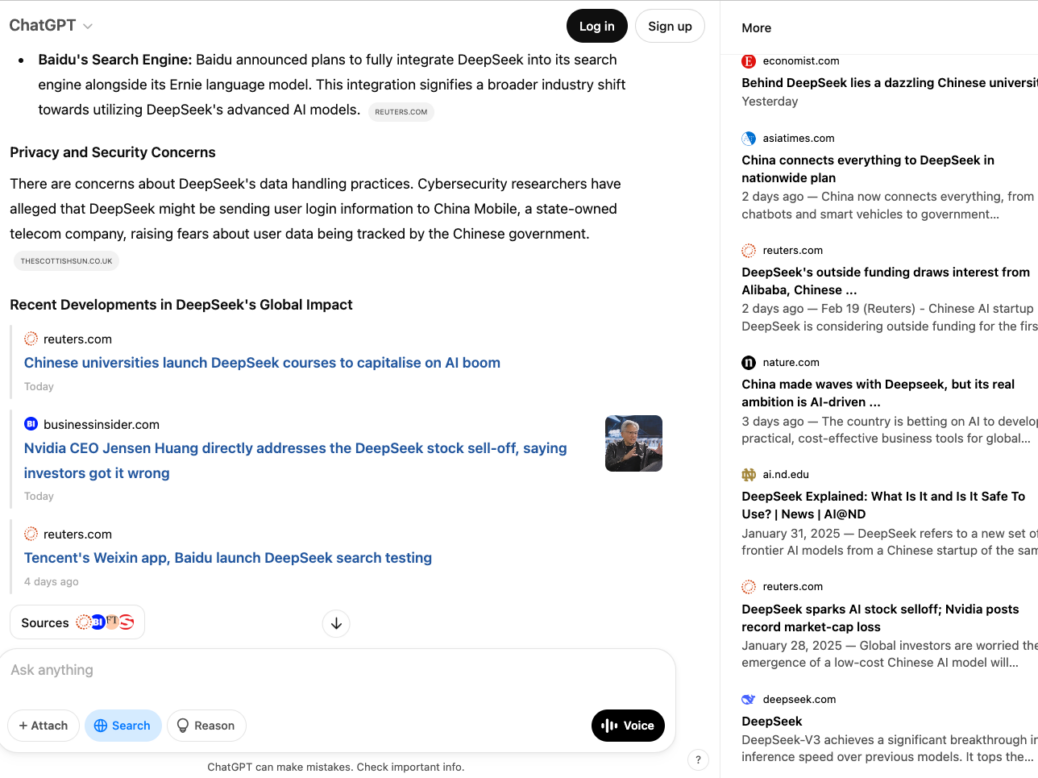
The amount of referral traffic to top news sites from ChatGPT is increasing quickly, new data from Similarweb shows, but still accounts for a miniscule proportion of visits.
Total desktop and mobile web visits globally referred to 14 leading publishers by the OpenAI-owned ChatGPT rose eight times from 435,000 in August to 3.5 million in January.
However that same group of sites received a total of 3.8 billion visits in January, meaning traffic from ChatGPT represented less than 0.1% of all visits.
The sites included in our analysis are: The New York Times, Washington Post, Guardian, CNN, USA Today, Fox News, BBC, Forbes, AP, People, India Times, New York Post, CBS News and CNBC.
Meanwhile AI search engine Perplexity has delivered between 450,000 and 850,000 visits per month to the same websites over the six-month period. It has not seen the same consistent upward trajectory as ChatGPT.
Generative AI tools like ChatGPT and Perplexity answer questions in natural language on their own platforms, meaning users do not have to click through to another website to get the information they’re looking for as they have traditionally done with search engines like Google (not counting any impact from Google AI Overviews).
But this has left news publishers continuing to expensively produce the information that answers user queries on platforms like ChatGPT without receiving compensation via web traffic and the resultant display advertising income.
OpenAI says it now has 400 million weekly active users, up 33% in three months. In contrast Google search, which has for years been a leading referral source for news publishers, saw its market share drop below 90% last month for the first time in a decade.
Google chief executive Sundar Pichai, who has overseen the introduction of generative AI powered AI Overviews at the top of many users’ search results, has previously insisted that users are more likely to click a link presented in these previews, although the company is yet to release data to support this point.
Similarweb data on referrals from ChatGPT shows a strong upward trend, but appears unlikely to replace traffic lost from Google.
OpenAI began testing its prototype SearchGPT search engine with select users in July, promising that the feature was “designed to help users connect with publishers by prominently citing and linking to them in searches”. The product, which links to sources and allows users to click through for a comprehensive list of citations, was integrated into ChatGPT itself at the end of October, made available to all logged-in users in December and opened up to all users regardless of whether they are logged in this month. Users must click the "Search" button on the ChatGPT console to receive real-time answers and comprehensively cited sources.
In January, the New York Post was the biggest beneficiary of traffic referrals from ChatGPT among the 14 publishers analysed, receiving 760,000 visits from the chatbot. It was followed by The Guardian (730,000) and Forbes (560,000).
Perplexity sent the most traffic to The New York Times (146,000 visits), CNN (139,000) and India Times (117,000).
The New York Post is owned by News Corp, which has signed a deal with OpenAI that may mean its content has better visibility in ChatGPT answers. The Guardian also struck a deal with the company this month.
The Post’s total worldwide traffic in January was 143.5 million, however - meaning its ChatGPT referral traffic made up 0.5% of its overall visits.
Referrals appear to be broadly increasing or staying level over the period assessed. Several publishers saw a ChatGPT referral traffic bump in November, the month of the US presidential election and a bumper month for visits to many news outlets.
From August to October the top three sites for ChatGPT referrals in this analysis were The New York Times, The Guardian and Forbes. The New York Post’s ChatGPT traffic began increasing quickly in November, while The New York Times - which is currently suing OpenAI for alleged copyright abuse - has fallen back since the election.
Referrals from Perplexity meanwhile do not clearly seem to be increasing. As with ChatGPT traffic, several sites saw a traffic bump from Perplexity in November.
Both ChatGPT’s search engine feature and Perplexity generally include citations and links to sources. A common theme of the deals being struck between OpenAI and news businesses is that they have included requirements around more prominent surfacing of sources and linking in ChatGPT.
Across the six months, the biggest beneficiary of Perplexity referral traffic among the 14 sites analysed was Forbes (958,000 visits) followed by India Times (636,000) and CNN (591,000).
Forbes has also done the best for referrals from ChatGPT, attracting 1.7 million click throughs from the platform over the period. It was followed by the New York Post and The Guardian (both 1.6 million).
Forbes consequently received the most combined traffic from both platforms over the six months, followed by The New York Times and The Guardian.
Email pged@pressgazette.co.uk to point out mistakes, provide story tips or send in a letter for publication on our "Letters Page" blog

